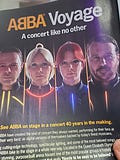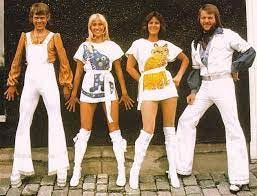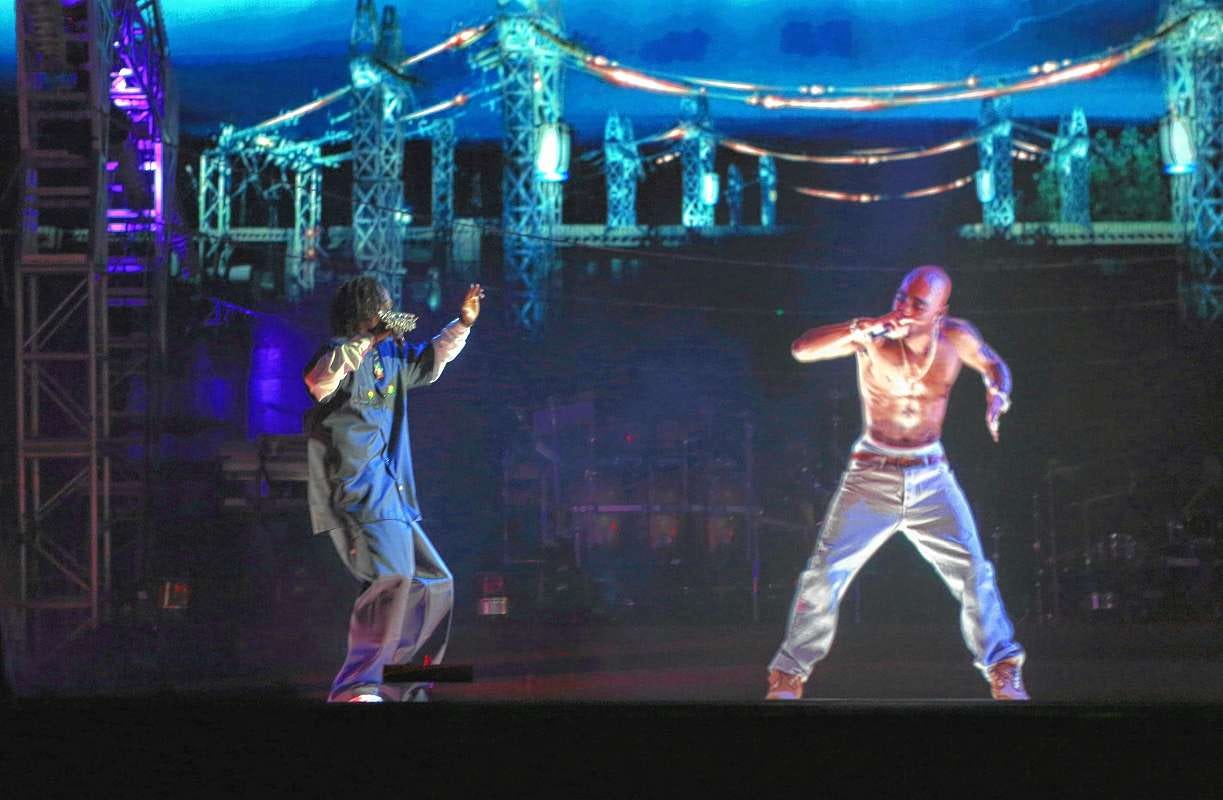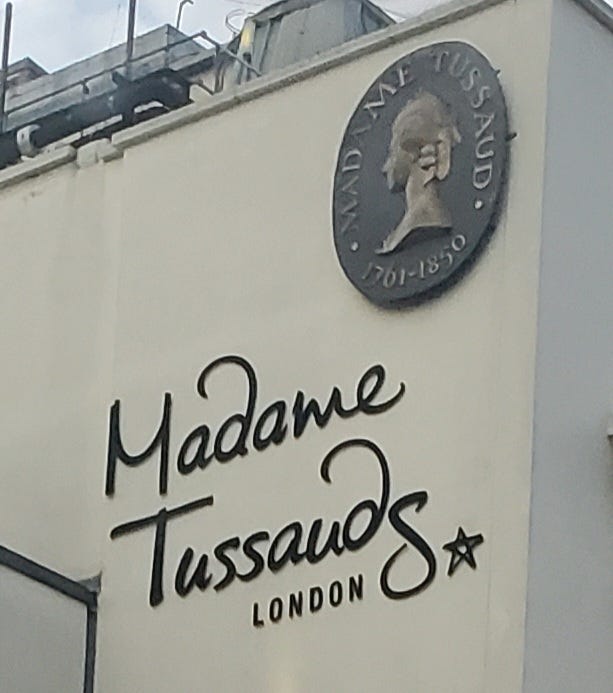If you've been in London in the last year and a half, you've probably seen the advertisements for ABBA VOYAGE on the elevator down to the tube. "Groundbreaking. Jawdropping. It has to be seen to be believed," they say. It is, they continue, "A concert like no other."
As a journalist and writer, I needed to check those claims out, and what I discovered when I did so last week was that Karl Marx was right. There's a spectre haunting Europe alright, but it's not the one he was thinking of, not by a long shot. If anything, the spectres of the four members of Abba, who "perform" as holograms to sold out houses every night at a purpose-built arena in East London, are the opposite of communism: they are greedy avatars of global capitalism and useless technological innovation built specially to suck capital out of the gormless proletariat.
I had to go anyway, though because I am a gormless capitalist and also a fan of Abba. Plus, I like to write about live music. But this wasn't live music. Or...was it? That was the kabillion dollar question that I planned on asking myself while there. You can purchase tickets for it through the site where you buy all other tickets to the London stage, and that is correct, for the show is essentially a theater piece: as with theater, the act is the same every night. But then, so is Taylor Swift's show, more or less: the elaborate staging precludes much improvisation. Yet there is a difference between seeing Taylor live and seeing the soul-free bodies of Abba, coming direct to us from the Uncanny Valley, and that difference is reflected in the prices. I stopped thinking that the $150 I spent to see the Abba show was a lot the day I saw what they're charging for Neil Young tickets at the Greek in Berkeley.
Anyway, here's the deal. At Abba Voyage, four holograms of four real people, backed by many real musicians, perform 90 minutes' worth of songs by Abba. The holograms are of Anni-Frid Lyngstad, Bjorn Ulvaeus, Benny Andersson, and Agnetha Faltskoq, only they've all been de-aged (youthized?) like Harrison Ford was in the new Indiana Jones movie. As with theater, the show is the same every night. But there is something a little different about seeing Abba Voyage than, say, "The Lion King" or "Matilda the Musical." It is more like a rock concert in both the way it is staged and how the audience experiences it. To me, the Abba Voyage show begs a lot of questions about performance, rock stars, and the future of live music. But…if people can get that buzz from something mechanical and AI, then why go see the real thing?
I am not sure I have the answer to that, but one amazing thing about the Abba experience is the arena itself. Just to begin: it has its own tube stop. And it goes without saying that the ingress and egress, the toilet facilities, the merchandise booths and bars and the way it has been arranged is perfecto. They usher you in with no fuss or muss, shove a glass of prosecco in your hand (at 44 pounds for a bottle), and you're on your way.
(The night I went to see Abba was the night before the Pride March. Any real act would acknowledge that, in words, but the Abba show is too canned for that, so they gave us pride buttons and wristbands instead.)
My friend and I had tickets for the dance floor, which I'd heard was preferable (though I question that now.) And while we were waiting for their arrival (lol) I couldn't help but think how weird it was. I mean, did it really matter how near the stage we were, since the images we were going to see were hologrammic? Were we required to clap to show our appreciation?
The answer to those questions and others was apparently yes: we were required to clap, to wave our arms in unison, sing along and even hold phones up (although this was explicitly forbidden, they didn't stop you from doing it), exactly like a "real" concert.
But it WASN'T a real concert! Those gestures, especially clapping, are intended to be two-way: you clap to praise the artist, a speech act has occurred. I wanted to yell the entire time: "They can't hear you! They can't see you!" It required such a huge suspension of disbelief for me to act like this was a concert, but it was a suspension of disbelief that everyone else in the entire arena was perfectly pleased to make. They were shoving up against each other, elbowing closer to the stage - in other words, it was just as unpleasant as seeing any band anywhere.
And that's when I realized. The simulacrum we were taking part in at the Abba Arena isn't about watching holograms on the screen; it is about the people in the audience, who are all performing the act of being at a concert.
Isn't that strange? The audience is extremely diverse in terms of age, gender, and class (although to be honest I didn't see a lot of racial diversity). There were more women than men, but men weren't absent, and certainly there were people of all ages in attendance, a far wider range than I've seen at anything else recently. Say what you will about the shallowness of Abba's oeuvre, but every one of these people knew every note of every song (barring some of the newer ones), and they all connected this music with celebration. Weddings, school dances, bar mitzvahs, summer holidays; being flash-danced at train stations, used by synchronized swimmers, buzzing away in the back of a bus as you made your way across the country, any country; pounding away in the teenage discos at holiday resorts in the Algarve, you name it, it's there, the lingua franca of sound. Abba's music is omnipresent in the western world, but I mean that in a good way. All of us connect it with having a good time, which is why all of us in the Arena were having a group experience of the most profound type.
It must have cost ABBA a bomb to get this show started up - building the arena, the holograms, etc. - but now that's it's made it can run forever. And I have little doubt but that it will, here, and maybe elsewhere as well. They say they are going to take it on the road. However, I think the end result of this type of performance is that it will drive up the price of 'real' performances even more. Abba makes it clear: what people are paying for, when they pay to see Taylor Swift, is not hearing the music performed perfectly, or even hanging around other people who feel the same about it as they do. They are paying to be in the same room as her. For them, a spectre will not suffice.
* * *
Abba has not toured since 1979. They didn't really need to, since in those days one made a lot of money from record sales. That's not the case anymore since streaming doesn't give any musician a reasonable income: instead, musicians have to tour to capitalize on their hit songs, and even that isn't working out that well for many. A recent article in the Observer noted the closure of a number of music festivals due in part to the cancellation of various acts who simply could no longer afford the cost of touring. It's OK if you're Taylor or Bruce or Neil or Beyonce, but if you're not, it barely makes financial sense to do it anymore.
Abba seems to have split the difference by creating this show, but even so, I'm not sure holograms are the answer to the high cost of tickets - or the undoubted fact that many of the biggest rock acts are now on their last legs. Abba's holograms definitely lacked something human. I thought it was sweat; my friend suggested it was that their hair didn't muss while they sang, but either way it was perfectly clear that although they were realistically 3 - D and did all the things that people on stage would do, they weren't actually alive, and that is truly creepy. Although Abba's are less creepy than most holograms - Tupac's at Coachella for instance, or Michael Jackson's -- because the people they represent are still alive and therefore clearly consented to the process of being turned into ghosts.
A few days after the Abba show, I was on a bus going down the Marylebone Road and I happened to notice a large crowd of tourists queuing outside Madame Tussauds, which I guess is typical in the summer. There's a plaque on the building that says "1761 - 1850," which makes her almost pre-Industrial revolution. You can understand why people in the early 19th century wanted to see waxworks figures of famous people: it was pre-photography, so there was no other way to see them. Back then waxworks must have seemed so new and cool and utterly modern, maybe even haunting...which is more or less how one thinks of Abba holograms. The difference is that today you can access moving images of your heroes performing via movies, video, still photographs, recordings...you can follow them on Instagram and tweet to them on Twitter. In 1810, waxworks were radical. In 2023, are soulless holograms are…not.
To be honest, it seems a bit odd that Madame Tussauds and Abba Voyage show exist in the same city, in the same time period, both providing audiences with this weird simulacrum of human endeavor. Or maybe it isn't: maybe the human impulse to worship celebrities and their facsimiles goes really deep. It isn't inconceivable that Abba Voyage will be playing in Pudding Mill Lane for as long as Madame Tussauds has been in Mayfair. Perhaps audiences will be holding up their cellphones and shouting the lyrics to “Waterloo” 150 years from now.
###
Abba Voyage at the Abba Arena is playing indefinitely. You can purchase tickets here.







this is genius, thanks for going to see (??) "abba" so we don't have to